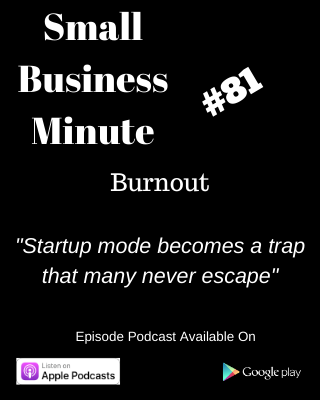Burnout is one of the leading causes of small business failures. The thing about burnout is that it usually gets justified as just hard work. Of course, entrepreneur knows that being self employed is going to require sacrifices and therefore, burning the candle at both ends is the price of admission to a better life. To that I say, yes and no.
Yes, because there is a price to pay for getting into business. No, because it shouldn’t become a way of life and this is the problem. Too many entrepreneurs never transition from startup up mode. What is startup mode? It’s when you’re doing everything. You’re the chief cook and bottle washer. Your empire consists of a staff of one, you! It’s all you. It’s what the vast majority of small business owners go through when they launch their businesses.
Unfortunately, startup mode becomes a trap that many never escape and can lead to burnout. What really should happen is at the first opportunity, you need to find a way to off load some of the duties and responsibilities. Whether that be hiring a part-time person or finding a virtual assistant of some sort, you need to start elevating your role at the earliest possible moment. Ideally, you should get some help the first day you hang out your shingle. I’m serious this can’t happen soon enough.
When I started my first company, The Sales Support Company, I was just like everybody else and I wasn’t afraid of hard work. The business needed to be national in scope as soon as possible, for it to really work. Fortunately, at that time, I had a partner. So, even though the workload got distributed pretty evenly. It still required that we put in long days. But that’s what we’re supposed to do, right?
After about four years, the partner was losing interest and needless to say, I was starting to shoulder more of the workload and decision making. Before long, it was evident this chapter was coming to an end, so I bought him out. So, what went from a little bit more work, turned into a doubling of my workload.
Suffice to say with a staff of 150 working coast-to-coast, the days grew much longer. Weekends became just two more days to get the work done. This went on for almost another four years before I decided that I’d had enough, and it was time to move on and I disposed of the company. It wasn’t until a few month later that I realized that towards the end I had hit the wall and was facing burnout.
Of course, my entrepreneurial journey was far from over, as I was committed to making my next endeavour a success. However, I wasn’t going to do so if it required the same level of work, nor was I prepared to risk that zombie like effect that comes from burnout. I had learned my lesson and I wasn’t about to let history repeat itself. I wanted to create an environment where nobody took work home, especially me, and that nobody needed to worked weekends.
This commitment, to normalizing the work hours, became a critical operating premise for the 17 years that I owned The Marketing Resource Group. Making this a cornerstone of the business, it then forced me to rethink how it was going operate as working longer hours was not an option. I decide that I needed to focus on three things if this was going to work.
1. Is it necessary?
As the business got off the ground, we questioned everything we were planning to offer in terms of client support or reporting. We asked the simple question – Does anybody care about it? It may be a nice to do, but if the client didn’t care, why should we waist our time on it. It’s easier not to offer something than to offer it and then try to take it away. We would regularly ask the client if they needed any other information, but what we found out was they were satisfied with what we were providing because it already exceeded what they had expected.
2. Can we automate this?
I must admit that I had limited technical abilities, but if I was going to drive this initiative forward, I needed to lead from the front. The sad part was of the two employees I had at the time, I was the most tech savvy, which wasn’t saying much. So, I took it upon myself to prepare all the databases and entries screens and automating all the reporting. As the years went on though, this activity was transitioned to others with a mandate that we use off the shelf software, so that we didn’t need high priced programmers.
3. Delegate as much as I could.
I recently read that when the leader start to delegate everything, it’s a sign that they’re bored. I think that’s a load of crap. Leaders shouldn’t be doing. They should spend most of their time teaching and being available to help their staff. With any remaining time strategizing or in customer contact. By delegating as much as possible it forced me to better explain my expectations and the steps required to complete the assignment.
These three things, along with other smaller initiatives, allowed me to go home at the same times as everyone else most evenings. Eventually, I was able to be the last in, in the mornings and first out most days. Which is the exact opposite of most business owners.
What’s really strange is that as business owners we have the right to set the parameters within which we want to operate. We have that freedom. But too often we don’t even give it a second thought. We think we must do like every other owner and work our butts off. When you consider that freedom is one of our primary goals for going into business, few ever achieve it.
For me, setting my work parameters made me a much better leader and manager, and I never faced burnout again.
Copyright © Greg Weatherdon
If you found this helpful, Tweet, Like or tell a friend.
Get More LIFE Out of Your Business
You shouldn’t be the hardest working person in your company.
Many small business owners find that even after the struggling start-up years, they’re working too many hours and still managing every aspect of their businesses.
Greg Weatherdon has been there, done that. As an entrepreneur, he learned not only how to get a business to the point of running smoothly, but also how to reduce the number of hours he worked, delegate more responsibility to his employees, and take longer vacations while his business chugged along like a well-oiled machine. And now he is providing the secret to success.
Do you suffer from any of the following?
1. Business ownership isn’t living up to the dream.
2. Endless workdays.
3. You can’t find good people.
4. Profits are less than expected.
5. You can never take a vacation.
You’re not alone. But there is a solution. As Greg demonstrates, with some time and effort, you really can Get More Life Out Of Your Business.




